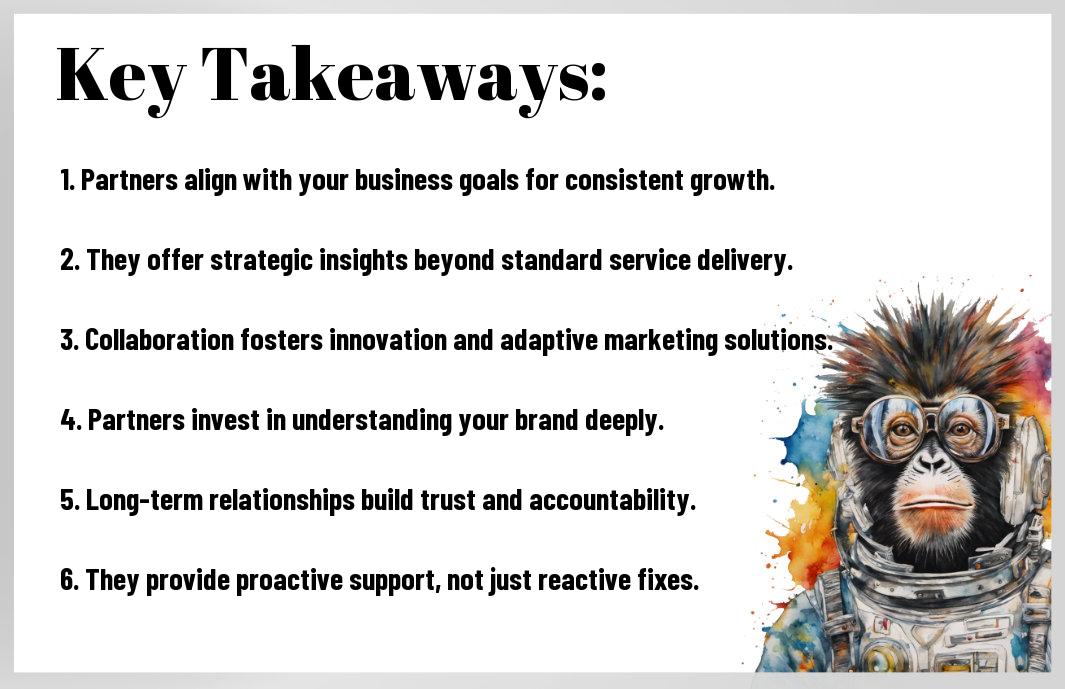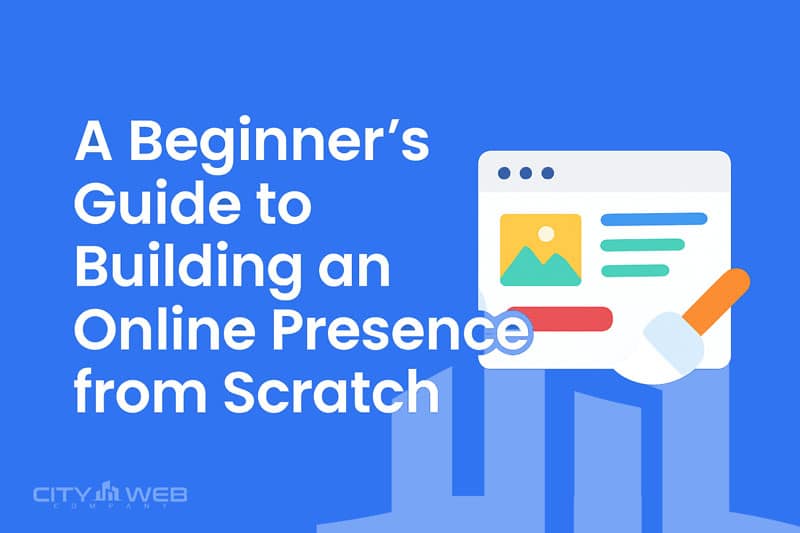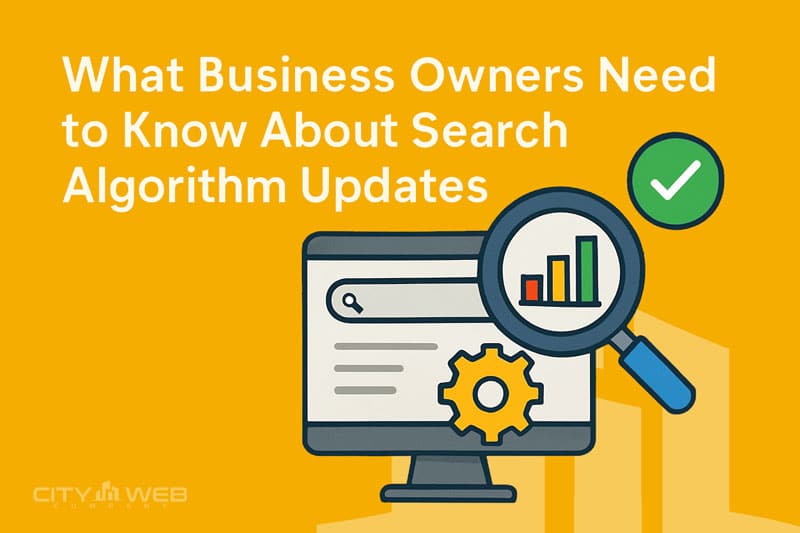This guide will empower you to establish a strong online presence from the ground up…

Why Your Business Needs a Marketing Partner – Not Just a Vendor
Most businesses underestimate the value of having a marketing partner versus simply hiring a vendor to handle specific tasks. When you collaborate with a dedicated partner, you gain access to strategic insights, tailored solutions, and a deeper understanding of your brand’s goals. This relationship enables proactive growth and creative innovation, helping your company to navigate challenges more effectively. By investing in a true partnership, you set the stage for long-term success that goes beyond mere transactions and instead fosters sustainable relationships and growth opportunities.
Table of Contents
Key Takeaways:
- Marketing partners provide strategic insights that align with your business goals, unlike vendors who often focus solely on transactional services.
- Collaboration with a marketing partner fosters creativity and innovation, leading to more effective campaigns that resonate with your target audience.
- A dedicated marketing partner establishes a deeper understanding of your brand, which enhances brand messaging and consistency across all platforms.
- Ongoing support and communication with a marketing partner ensure adaptability and responsiveness to market changes, keeping your strategies relevant.
- Investing in a marketing partner can lead to long-term relationships that enhance customer loyalty and brand equity over time.
The Value of a Collaborative Relationship
A successful marketing partnership thrives on a collaborative relationship that fosters open communication and shared goals. Engaging with a marketing partner allows you to integrate their insights and expertise into your strategy, enhancing your business’s ability to respond to market shifts quickly. In turn, your marketing partner gains a deeper understanding of your unique challenges and objectives, leading to tailored strategies that truly resonate with your target audience. For more on this dynamic connection, check out this article: Don’t Call It a Vendor: Why Modern Marketing Needs ….
The Difference Between Partnership and Vendor Relationships
The distinction between a partner and a vendor lies in the level of investment in the relationship. Vendors typically provide transactional services without much insight or involvement beyond what’s expressly required. In contrast, partnerships are built on shared goals and collaborative efforts, where both parties actively engage in creating value. This kind of symbiosis results in innovative strategies and a deeper understanding of your brand’s mission.
Enhancing Brand Strategy Through Collaboration
Collaborative efforts with a marketing partner not only strengthen the execution of your current strategies but also pave the way for new ideas and innovations. Partnerships enable you to leverage each other’s strengths—your industry knowledge paired with your partner’s marketing expertise can lead to groundbreaking approaches that captivate your audience. By embracing this synergy, you foster an environment where creative solutions flourish, driving your brand’s growth and relevance in an ever-evolving market.
For example, consider a tech startup partnering with a seasoned marketing agency. The startup brings in its cutting-edge product knowledge, while the agency contributes expertise in data analytics and customer engagement. When these two forces combine, they can identify niche markets and tailor campaigns that effectively communicate the product’s unique features. Such collaborative strategies yield much higher conversion rates and customer loyalty than traditional vendor relationships could ever achieve.
Navigating a Complex Marketing Landscape
The marketing landscape today is intricate and ever-evolving, making it challenging for businesses to keep pace. From digital advertising to social media, content marketing, and SEO, each channel requires nuanced strategies and constant adaptation. Your competition is fierce, as companies continuously seek innovative ways to capture audience attention amid a cacophony of messages. In this environment, merely contracting services from a vendor may leave your business reactive rather than proactive in navigating these complexities.
The Multifaceted Nature of Modern Marketing
Modern marketing encompasses a multitude of channels, including social media, email, SEO, influencer partnerships, and beyond. Each facet demands distinct strategies and specialized knowledge to execute effectively. As consumer behaviors change, so too must your marketing tactics, necessitating a broader approach that transcends the limitations of traditional vendor relationships.
Leveraging Specialized Expertise for Growth
Forming a partnership with a marketing expert allows you to tap into a wealth of specialized skills tailored to today’s demands. Your business can benefit from insights into best practices in analytics, content creation, and audience targeting. With access to data-driven strategies, you enhance your agility and readiness for market shifts, ultimately propelling growth more effectively than using a one-size-fits-all vendor model.
Through collaboration with specialized partners, you gain valuable perspectives that can transform your marketing strategy. For example, a partner well-versed in SEO strategies may introduce innovative keyword approaches and content optimizations tailored to your specific audience, effectively increasing your visibility. This strategy isn’t just about improving search rankings; it’s also about understanding user intent, leading to higher engagement and conversion rates. By leveraging expertise across various marketing disciplines, you build a well-rounded strategy that addresses diverse goals, from brand awareness to lead generation.
Outcome-Oriented Marketing: A Game Changer
Outcome-oriented marketing shifts the focus from mere transactions to results that truly matter for your business growth. This approach prioritizes customer engagement, satisfaction, and long-term relationships over one-time sales, positioning your brand for sustainable success. Instead of merely targeting immediate sales boosts, you work hand-in-hand with your marketing partner to create strategies that resonate with your audience, ensuring your efforts yield tangible, lasting results.
Metrics That Matter: Moving Beyond Transactions
Sales figures alone won’t give you the full picture of your marketing effectiveness. Tracking metrics like customer lifetime value (CLV), engagement rates, and brand loyalty can reveal patterns that facilitate deeper insights into your marketing strategy. By adopting these metrics, you gain a comprehensive understanding of your customers’ journeys, allowing you to tailor marketing efforts that foster stronger, more meaningful connections.
Establishing Long-Term Goals with a Marketing Partner
Partnering with a marketing expert enables you to set long-term goals, aligning strategies with your overall business vision. These goals can encompass customer retention, brand awareness, or market penetration, and provide a foundation for measurable success. Establishing clear objectives not only guides your marketing initiatives but also creates a roadmap for your future growth and ensures that every campaign contributes to your strategic aspirations.
Working collaboratively with your marketing partner allows you to define clear objectives that extend beyond quarterly targets. For instance, if your primary goal is to increase customer retention by 20% over two years, your partner can help outline specific strategies to achieve this, including personalized marketing campaigns, loyalty programs, or enhanced customer service initiatives. Not only does this comprehensive approach boost accountability, it fosters a deeper connection with your audience and creates an adaptive marketing strategy that evolves with your business needs.
Building Brand Loyalty Through Trust and Engagement
Brand loyalty stems from trust and engagement, two necessary elements when cultivating long-lasting relationships with customers. By focusing on genuine interactions and consistently delivering value, your business can transform one-time buyers into loyal advocates. Effective marketing partners understand how to create strategies that resonate with your audience, ultimately fostering a community that supports your brand and contributes to its longevity.
Creating Authentic Connections with Target Audiences
Authentic connections become possible when your business actively listens to your audience’s needs and desires. Engaging in two-way conversations and personalizing communications demonstrates that you value their opinions, leading to a deeper emotional bond. Embrace customer feedback and showcase it in your marketing efforts, ensuring that your audience feels heard and appreciated.
The Role of Storytelling and Brand Narrative
Storytelling serves as a powerful tool for conveying your brand’s mission and values, making it easier for your audience to relate to what you stand for. A compelling narrative will enable your customers to see themselves within your story, driving loyalty and engagement as they connect emotionally with your brand.
A strong brand narrative creates a memorable experience that transcends the products or services you offer. By sharing stories that reflect your values and highlight customer success, you invite your audience into a shared journey. For instance, brands like TOMS effectively leverage their founding story to engage customers and inspire them to make a difference, resulting in a loyal customer base that feels part of something greater. This approach not only enhances brand perception but also fosters an emotional connection that encourages repeat patronage and advocacy.
Future-Proofing Your Business with Strategic Alliances
Strategic alliances enable your business to adapt and thrive in an ever-changing marketplace. By collaborating with a marketing partner rather than a vendor, you gain access to diverse expertise, resources, and innovative practices that form the backbone of a resilient strategy. These partnerships create a buffer against unpredictable market fluctuations, ensuring that your business not only survives but also flourishes in the face of uncertainty.
Anticipating Market Trends and Staying Ahead
Your marketing partner plays a pivotal role in helping you anticipate market shifts. With their finger on the pulse of industry trends and consumer behavior, they provide invaluable insights that keep you informed. This proactive approach means you can pivot your marketing strategies swiftly, positioning your brand at the forefront of emerging opportunities and ensuring you don’t fall behind.
The Benefits of Agility and Innovation in Partnership
The collaboration you cultivate with a marketing partner fosters an environment where agility and innovation thrive. Their specialized knowledge allows you to implement cutting-edge strategies that can quickly adapt to market demands. For instance, businesses that engage in this dynamic relationship often turn ideas into action far more efficiently, delivering unique campaigns that resonate with audiences. This adaptability not only enhances your brand’s relevance but can also unlock new revenue streams and customer loyalty.
Agility in partnership means you can test and iterate on new concepts rapidly, mitigating the risks associated with stagnation. For example, a case study involving a tech startup demonstrated that through constant collaboration with their marketing partner, they launched a series of innovative product features ahead of their competitors. This process drastically reduced the time from idea generation to execution, allowing the business to capitalize on fleeting market trends. By embracing this level of innovation, you position your business as a leader rather than a follower, ensuring that your brand remains top-of-mind for consumers.

Summing up
So, as you navigate the complexities of the business landscape, partnering with a marketing ally rather than merely hiring a vendor can significantly enhance your growth potential. A genuine partnership allows for collaborative strategies tailored to your unique goals, fostering innovation and adaptability in your marketing efforts. This sustained relationship not only improves the effectiveness of your campaigns but also builds a deeper understanding of your brand and audience. Ultimately, investing in a marketing partner empowers you to drive meaningful results and elevate your business in an ever-evolving market.
FAQ
Q: What are the differences between a marketing partner and a vendor?
A: A marketing partner collaborates closely with your business to understand its goals, culture, and target audience, offering tailored strategies and solutions. On the other hand, a vendor provides specific products or services without a deep understanding of your overall objectives. The relationship with a partner is often ongoing and strategic, while a vendor relationship can be transactional and one-off.
Q: How can a marketing partner benefit my business in the long run?
A: By working proactively with a marketing partner, your business can enjoy sustained growth through continuous improvement and adaptation to market changes. A partner invests time in understanding your brand and its unique challenges, leading to more effective campaigns, enhanced customer engagement, and ultimately, increased revenue over time.
Q: What should I look for when choosing a marketing partner?
A: When dicking out a marketing partner, consider their experience in your industry, their approach to strategy development, and their willingness to collaborate. Look for a partner who provides evidence of successful case studies, culturally aligns with your values, and possesses a wide range of expertise in areas such as digital marketing, content creation, and analytics.
Q: Can a marketing partner help me adapt to changes in my business environment?
A: Yes, a marketing partner plays an important role in helping you navigate changes in the market. They stay attuned to industry trends, consumer behavior shifts, and emerging technologies, allowing them to adjust your marketing strategy effectively. This flexibility ensures your business can respond in real time, staying competitive and relevant.
Q: What are the key benefits of having a long-term marketing partnership?
A: Long-term marketing partnerships foster a deeper understanding of your business over time, leading to more cohesive and aligned marketing efforts. This relationship enhances brand consistency, builds trust with your audience, and allows your marketing partner to refine strategies based on accumulated data and insights, ultimately driving better performance and results.



